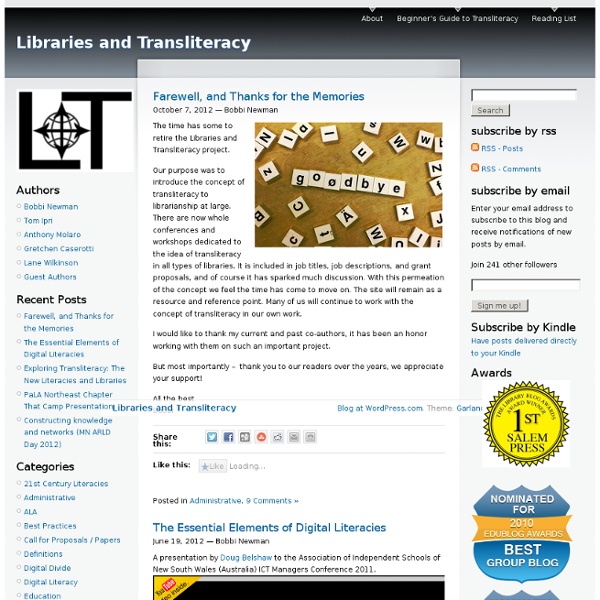



Digital Visitors and Residents [OCLC - Activities] The University of Oxford and OCLC Research, in partnership with the University of North Carolina, Charlotte, are collaborating on a JISC-funded study to investigate the theory of digital residents and visitors with learners in the educational stages: Emerging (Late stage secondary school-first year undergraduate); Establishing (Second/third year undergraduate); Embedding (Postgraduates, PhD students); and Experienced (Scholars). This work will increase understanding of how learners engage with the Web and how educational services and systems can attract and sustain a possible new group of lifelong learners. The trans-Atlantic partnership will support comparison of students' digital learning strategies in different cultural contexts. Further details... Outputs currently available Interim Reports to JISC June 2012 Progress Report 22 July 2011 (.pdf: 560K/13 pp.) Jisc infoKit White, David, Lynn Silipigni Connaway, Donna Lanclos, Erin M. Presentations Recent Publications Bartlett, Sarah. 2012. Mr.
Metaliteracy.org Introducing transliteracy — College & Research Libraries News Tom Ipri + Author Affiliations Transliteracy is recent terminology gaining currency in the library world. It is a broad term encompassing and transcending many existing concepts. Transliteracy originated with the cross-disciplinary Transliteracies Project group, headed by Alan Liu from the Department of English at the University of California-Santa Barbara. The essential idea here is that transliteracy is concerned with mapping meaning across different media and not with developing particular literacies about various media. The working definition of transliteracy, as put forth by Thomas, states that it is “the ability to read, write and interact across a range of platforms, tools and media from signing and orality through handwriting, print, TV, radio and films, to digital social networks.” Basically, transliteracy is concerned with what it means to be literate in the 21st century. Transliteracy is new enough to be unknown to many in the library profession. © 2010 Tom Ipri
Developing digital literacy in higher education: live chat | Higher Education Network | Guardian Professional The popularity of the Guardian's digital literacy campaign shows not only how much interest there is in this topic but also how much misunderstanding there is about what digital literacy is, or what purpose it serves. So what is digital literacy? In a blog for the us, JISC InfoNet researcher Doug Belshaw, describes the digitally literate as knowing how the web works, understanding how ideas spread through networks and able to use digital tools to work purposefully towards a pre-specified goal. But he then laments that digital literacy goes beyond mere computing skills such as using a word-processor or a database: "The digital world is not a single, homogeneous space and, as a result, the literacies we require to traverse and interact in this space vary enormously. The digital landscape changes rapidly meaning that young people require not a static functional literacy, but a critical and creative set of attributes that help them to navigate various networks." Panel to follow
New Media Literacies — Learning in a Participatory Culture Transliteracy Research Group At 3Ts 2013: Transliteracy from Cradle to Career in Saratoga Springs this week I learned some new things about transliteracy. 1. In What I Want, When I Want to Watch It: Brief Thoughts on Television Literacy in the Streaming World with Hollie Miller & Michele Forte, Hollie aka @theotherinside showed us a feature on Hulu Plus which allows you to choose between adverts. That means that when the ads come on - as they invariably do - if you don't like the one they're showing, you can choose a different ad from several on offer. Very interesting ad-based literacy - I've never been asked to consciously choose my own ads before, even though I know I'm already trading off that information on many of my social media platforms. 2. many people, I'm sure, would find the image more memorable than the number. 3. So, three new personal takeways for me from this one day conference - very valuable and energising.
Developing digital literacies Overview Many learners enter further and higher education lacking the skills needed to apply digital technologies to education. As 90% of new jobs will require excellent digital skills, improving digital literacy is an essential component of developing employable graduates. Courses that embed core digital skills, as well as subject specific use of technology, enable students to gain the skills and confidence they need to use digital technology not only to support their learning but also in the workplace. We’re working with colleges and universities to embed core digital skills into the curriculum. Developing Digital Literacies programme JISC has funded a £1.5 million Developing Digital Literacies programme 1which runs from July 2011 to July 2013, with benefits realisation activities continuing until the end of December 2013. Further information about the funded projects is available from the programme page 5and the programme blog6. Overview of JISC Digital Literacies activities
Metaliteracy